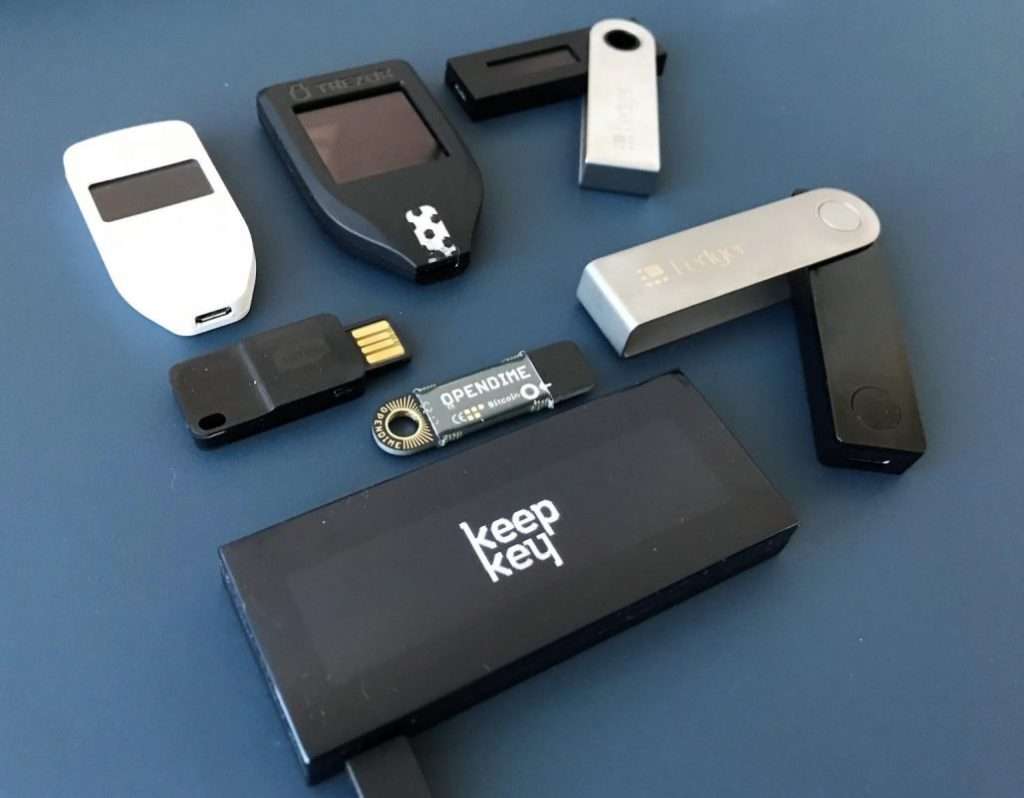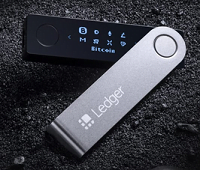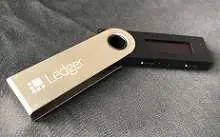With Bitcoin’s “little brother”, Litecoin, the selection of wallets is just as extensive as with BTC. To help you find the right wallet for your needs, we have created this guide, which presents the best Litecoin wallets, categorized by wallet type. To understand the differences between each wallet type, we provide a brief introduction below.
The most fundamental distinction is between:
- Cold wallets
- Hot wallets
The difference between these two categories is the connection to the Internet. Cold wallets are called “cold” because they are never connected to the Internet. In contrast, hot wallets remain online at all times, making them more convenient but less secure. The reason is that hackers can exploit internet connections to access hot wallets, while cold wallets do not have this vulnerability.
Because of this, cold wallets are significantly safer than hot wallets. This is why major crypto investment firms and cryptocurrency exchanges store the majority of customer funds in cold wallets.
You should follow their example! For private users, cold wallets can be purchased as hardware wallets or created for free as paper wallets. Hardware wallets are small devices, often resembling USB sticks, that allow you to securely manage Litecoin and many other cryptocurrencies.
Meanwhile, hot wallets can be further categorized based on how the private keys are stored:
- Litecoin desktop wallets
- Litecoin mobile wallets
- Litecoin online wallets
A private key is a randomly generated string that proves ownership of your cryptocurrency and allows you to send Litecoin. Never share your private key with anyone. If someone else has your private key, they can access your wallet and spend your LTC.
A wallet address is a hash version of the public key, which cannot be reversed thanks to cryptographic encryption. Unlike the private key, your public key or wallet address can be shared freely.
Before you continue reading, we want to give you two important pieces of advice:
- Before you buy Litecoin (click here to read our guide), decide which wallet you will use so you can enter your external wallet address during the purchase process. This can help you save time and avoid extra fees.
- Never store Litecoin (LTC) on an exchange or broker wallet for a long time. When you do so, the private key is controlled by the trading platform, not by you. This creates a risk in case of hacks or platform failures. Our recommendation: Set up an external wallet and manage your private keys yourself.
Litecoin hardware Wallets

Hardware wallets are the de-facto standard for securely managing large amounts of cryptocurrencies. Compared to all other wallet types, they offer the highest security standard as cold wallets. With a hardware wallet, your Litecoin private key never comes into contact with the Internet.
This private key is stored exclusively on the hardware wallet, ensuring that even when approving an LTC transaction, it remains offline—transactions are signed within the device. This design protects hardware wallets from phishing attacks and malware, as only non-critical components of the device communicate with the Internet. Theft of the Litecoin private keys from a hardware wallet is virtually impossible.
Additionally, hardware wallets provide excellent security in case the device itself is stolen. Each hardware wallet presented below is protected by a PIN code. Many models also support two-factor authentication (2FA) for an added security layer, making them extremely difficult to hack, even if stolen.
From our perspective, purchasing a hardware wallet is always recommended if you invest substantial amounts in Litecoin. Even the price of our test winner, the Ledger Nano X (around 120 euros), is likely insignificant compared to the value of your investment.
Below, we’ve summarized the key advantages and disadvantages of hardware wallets:
✅ Storage of private keys offline
✅ hardware wallets mostly support numerous cryptocurrencies
✅ Regular updates by reputable hardware wallet manufacturers
✅ Physical confirmation is required on the device for each transaction.
✅ Excellent customer support from established manufacturers
❌ Secure storage of the wallet is your responsibility. However, this can also be an advantage!
Below, we introduce you to the top five Litecoin hardware wallets. For in-depth reviews, check out our detailed test reports on the best hardware wallets.
1.Ledger Nano X
In our extensive comparison of 8 different hardware wallets, the Ledger Nano X emerged as the test winner. It is the successor to the popular Ledger Nano S, which has been sold over 1.3 million times worldwide.
In May 2019, Ledger released this significantly improved model, packed with new features. One of the most prominent additions is its Bluetooth functionality, allowing the Nano X to be connected to a smartphone. Through the Ledger Live App, users can operate their wallet like a mobile app, while maintaining the security of a cold wallet.
The Ledger Nano X also brings additional enhancements:
- Expanded storage capacity for up to 100 cryptocurrency apps (compared to just 5 on the Nano S)
- An enlarged display, making it easier to verify Litecoin addresses without scrolling
- A next-generation security chip for increased protection
Conclusion: No other hardware wallet matches the Ledger Nano X in terms of features and ease of use!
2.Ledger Nano S
Even though the Ledger Nano S is no longer the latest model, it remains one of the safest and most affordable hardware wallets on the market.
3.Trezor Model T
The Trezor Model T was launched as the successor to the Trezor One and offers significant upgrades.
- Touchscreen for easy transaction approval
- Upgraded firmware with enhanced security
- Faster processor for seamless operation
- MicroSD card slot for data encryption
- USB-C port for modern connectivity
4.Trezor One
The Trezor One is the longest-standing hardware wallet and remains a solid, budget-friendly option.
5.Digital Bitbox
The Digital BitBox is a compact, cost-effective hardware wallet supporting multiple cryptocurrencies, including Litecoin.
Litecoin desktop wallets
Desktop wallets belong to the category of hot wallets. As the name suggests, this type of wallet is a program (software) installed on a computer to send and receive Litecoin.
Compared to online wallets, desktop wallets offer the significant advantage that the private keys are not stored on a company server but on the user’s own computer. This allows users to maintain full control over their Litecoin without the need for a hardware wallet.
However, this control also comes with certain responsibilities. Since the private keys are stored locally, it is essential to keep your computer updated with the latest security patches and use strong anti-malware software.
Due to the continuous internet connection, there is an increased risk of phishing attacks and malware infections. Despite this, desktop wallets offer significantly better security compared to online and web wallets. From our perspective, desktop wallets are the best free alternative for storing Litecoin securely.
Below, we summarize the advantages and disadvantages of desktop wallets compared to other types of wallets:
✅ Full control over private keys
✅ No acquisition costs – free to use
✅ Regular software updates
✅ Each transaction requires manual confirmation
✅ High-security standards
❌ Less secure than hardware wallets (more vulnerable to hacker attacks)
❌ No deposit insurance, e.g., as offered by certain brokers
❌ Be cautious when choosing unknown wallets, as some have turned out to be fraudulent
Below, you will find our top recommendations for secure and reliable Litecoin desktop wallets:
- Electrum LTC
- Guarda Wallet
- Atomic Wallet
- Jaxx Liberty
- Exodus Wallet
- Litecoin Core Wallet
1.Electrum LTC Wallet

The Electrum LTC wallet is a fork of the widely popular Bitcoin Electrum wallet. Electrum has been a trusted name in the cryptocurrency space since 2011, and this Litecoin version maintains the same security and reliability.
Unlike the Litecoin Core Wallet, the Electrum LTC wallet is a lightweight client. It does not require downloading the full Litecoin blockchain but instead connects to specialized servers that index the blockchain. This allows the wallet to be used immediately after installation.
As a deterministic wallet, it provides excellent security by allowing users to generate a 12-word seed phrase. Additionally, the private keys and seed are stored locally and encrypted on the user’s computer, never being transmitted to Electrum’s servers.
The wallet features a simple yet powerful design, making it ideal for both beginners and advanced users. It also allows multi-device synchronization, meaning you can use the same wallet across different computers.
The Electrum LTC wallet is available for Windows, Mac, and Linux. You can download it from the official website here.
2.Guarda Wallet

Guarda Wallet is a multi-asset, non-custodial wallet that supports over 50 cryptocurrencies, including Litecoin (LTC). Designed for both desktop and mobile users, Guarda Wallet provides a balance of security, flexibility, and ease of use, making it a great option for those who want to manage their Litecoin and other digital assets without relying on a centralized exchange or custodial service. By giving users full control over their private keys, Guarda ensures that only the wallet owner has access to their funds, enhancing security and financial sovereignty.
One of Guarda Wallet’s strengths is its cross-platform accessibility, allowing users to manage their Litecoin holdings on Windows, Mac, Linux, iOS, and Android devices. This seamless integration across multiple platforms makes it convenient for users to access their funds at any time while maintaining full ownership of their assets. Additionally, Guarda Wallet supports in-wallet crypto purchases and exchanges, enabling users to buy Litecoin directly with fiat currencies and swap it for other digital assets without needing an external exchange.
While Guarda also offers a web-based wallet, users should be mindful of potential security risks associated with online wallets. For maximum security, we recommend using the desktop version, as it provides stronger protection against potential phishing attacks and browser-based vulnerabilities. By choosing the desktop or mobile version, users can enjoy enhanced security, complete control over private keys, and the convenience of managing Litecoin and other digital assets on a trusted platform.
3.Atomic Wallet

Atomic Wallet is a powerful multi-asset wallet that supports over 300 cryptocurrencies, including Litecoin (LTC). It is designed as a non-custodial wallet, meaning users have complete control over their private keys and, by extension, their funds. Unlike custodial platforms where a third party manages security, Atomic Wallet ensures that private keys are stored locally on the user’s device, providing greater security and reducing reliance on external platforms.
One of the standout features of Atomic Wallet is its cross-platform availability, making it accessible on Windows, Mac, Linux, iOS, and Android. This flexibility allows users to manage their Litecoin and other crypto assets seamlessly across multiple devices. Whether accessing funds from a desktop computer or a mobile phone, users benefit from the same high level of security and functionality. Additionally, Atomic Wallet does not require registration or KYC (Know Your Customer) verification, allowing for greater privacy and anonymity compared to many exchange-based wallets.
Beyond simple storage, Atomic Wallet also offers built-in crypto purchasing and swapping features, enabling users to buy Litecoin with fiat using bank cards and exchange LTC for other cryptocurrencies directly within the wallet. This integration makes it a convenient all-in-one solution for crypto users looking to securely store, manage, and trade their digital assets without relying on third-party exchanges. For those seeking a private, secure, and highly versatile Litecoin wallet, Atomic Wallet stands out as an excellent choice.
Key Features:
- Non-custodial, meaning you control your private keys.
- Atomic Swaps feature allows direct crypto-to-crypto exchanges.
- Easy backup and recovery options.
4.Litecoin Core Wallet
The Litecoin Core Wallet is the official full-node wallet developed by the Litecoin Foundation.
As a full-node client, the entire Litecoin blockchain must be downloaded, making it best suited for advanced users and miners.
Mobile Litecoin wallets
Mobile wallets have the advantage that they can be installed on ordinary smartphones. This allows you to access and send your Litecoin from anywhere in the world where there is an internet connection.
Technically, mobile wallets share many similarities with desktop wallets. The private keys are usually stored encrypted on your smartphone. Many desktop wallet providers also offer a mobile version.
However, mobile wallets have the same issue as desktop wallets: a permanent internet connection, which makes them vulnerable to hackers. This issue is even greater with smartphones, as many users connect to public Wi-Fi hotspots in cafes and restaurants, where data is often transmitted unencrypted.
It is crucial to protect your smartphone with regular updates and, if necessary, anti-malware software. On the other hand, mobile wallets also provide the same advantages as desktop wallets. Below is an overview:
✅ Wallet access from anywhere with an internet connection
✅ Often supports multiple cryptocurrencies beyond Litecoin
✅ Simple and intuitive user interface
✅ Customer support available for assistance
❌ No deposit insurance, such as offered by some brokers
❌ Vulnerable to hacker or phishing attacks
- Loaf Wallet
- Atomic Wallet
- Jaxx Liberty Wallet
- Coinomi Wallet
- Edge Wallet
1. LoafWallet

LoafWallet is the official mobile wallet for Litecoin, launched by Charlie Lee, the creator of Litecoin, and is now developed by the Litecoin Foundation. It is a standalone Litecoin wallet that supports only Litecoin (LTC) and is available for free on iOS and Android.
A major advantage of LoafWallet is that it is developed by the Litecoin Foundation, ensuring that it remains up to date with regular updates. No personal data is required for download.
The wallet offers strong privacy protection, with private keys stored only on the user’s device. Users can set up a PIN and passphrase for added security. LoafWallet does not rely on centralized servers, which means it cannot be hacked or taken offline.
2. Atomic Wallet

The Atomic Wallet is a multi-coin wallet supporting over 300 cryptocurrencies, including Litecoin. It is available as both a desktop and mobile wallet. The mobile version offers the same functionality as the desktop version.
Private keys and transaction data are stored encrypted on the smartphone, meaning no third parties, including developers, have access to them. The mobile wallet also features Atomic Swaps and built-in exchange services from Changelly and ShapeShift.
You can download the wallet from the official website, or from the iOS and Android app stores.
3. Jaxx Liberty Wallet

Jaxx Liberty is a popular multi-coin wallet that supports Litecoin and over 80 other cryptocurrencies. It is available for both desktop and mobile devices, offering a seamless experience across platforms.
Private keys are stored on the user’s device, ensuring security. The wallet features a backup option and offers excellent customer support.
4. Coinomi Wallet

Coinomi is a multi-asset wallet supporting over 275 cryptocurrencies, including Litecoin. It was launched in 2014 and has gained a strong reputation.
5. Edge Wallet

Edge Wallet is a versatile and user-friendly cryptocurrency wallet that supports Litecoin (LTC) along with 17 other digital assets. Unlike custodial platforms, Edge Wallet operates as a non-custodial solution, meaning users retain complete control over their private keys. This approach enhances security and privacy, as users do not have to rely on a third party to safeguard their funds. By giving individuals full ownership, Edge Wallet ensures that they alone have access to their cryptocurrencies, reducing risks associated with exchange hacks or platform failures.
A standout feature of Edge Wallet is its built-in fiat on-ramp, which enables users to buy Litecoin directly with traditional currencies like USD, EUR, and others. This eliminates the need to use external exchanges, streamlining the purchasing process and making it more convenient for newcomers. Through integrated payment providers, users can acquire Litecoin using credit cards, bank transfers, and other payment methods, making Edge Wallet a comprehensive solution for both storage and acquisition of crypto assets.
Security and ease of use are key advantages of Edge Wallet. It features client-side encryption, meaning all sensitive data is encrypted on the user’s device before it reaches Edge’s servers. This ensures that no one—not even Edge—can access private keys or funds. Additionally, the wallet includes backup and recovery features, such as username and password authentication, making it more accessible than traditional seed-phrase-based wallets. For those looking for a secure, private, and flexible way to store and buy Litecoin, Edge Wallet offers a strong alternative to custodial services.
Litecoin online wallets
Litecoin online wallets offer an even simpler way to manage Litecoin than the previously introduced wallets. Online wallets have the great advantage that there is no need to set up, install or create a backup, and only one login is required. Basically, online wallets can be grouped into two categories.
The first type are the accounts (wallets) on a cryptocurrency exchange. These offer the considerable advantage that the user does not have to worry about anything. The major disadvantage is that they require a high level of trust in the trading platform.
The users of an exchange wallet must be confident that the platform will store the cryptocurrencies in cold storages and that the IT infrastructure will not be hacked. In addition, the employees who have administrative access must be trusted. At this point, we would like to mention the Mt. Gox hack, which may have been an inside job (which could never be clarified). Well-known exchanges and brokers generally have very good security measures for each of these points of attack. However, exchange wallets are not very recommendable for the permanent storage of Litecoin.
The second type of online wallets are Litecoin-specific developments. LiteVault is probably the most popular and best-known Litecoin online wallet. Below is an overview of the advantages and disadvantages of online wallets:
✅ Exchange wallets enable trading directly from the wallet
✅ No installation work required for exchange wallets
✅ Option to set limits for maximum payouts per transaction
✅ Simple and intuitive user interface
✅ Often very good customer support
❌ Management of private keys is often transferred to a third party
❌ Greater likelihood of hacking or phishing attacks
❌ Some web wallet providers have been scams in the past
- LiteVault
- Binance
- eToro
- Litebit
1. LiteVault

LiteVault is an online wallet developed specifically for Litecoin, featuring an open-source design. It is a web-based wallet that uses in-browser cryptography to store LTC and is similar to Blockchain.info. LiteVault allows users to send and receive Litecoin transactions and integrates with Changelly, enabling users to buy LTC via credit card and exchange it for other altcoins.
When you log in to LiteVault, your web browser sends your identifier to a LiteVault server, which returns an encrypted version of the wallet using the AES algorithm. Your browser decrypts this data with your password (which is never sent to the server) to load your private key to sign transactions.
When you make a transaction, LiteVault uses the private key stored in the browser’s memory. After signing, the transaction is transferred as a hash to the LiteVault server, which then forwards it to the Litecoin network.
LiteVault is developed by Someguy123, who states on the official website:
I am a trustworthy website developer within the Litecoin community who is responsible for various services, including the Litecoin Block Explorer and the administration of various official Litecoin resources such as Wiki and IRC.
2. Binance Wallet

Managing Litecoin on Binance can be an option if you plan to trade cryptocurrencies. Over 150 cryptocurrencies can be traded from the wallet on one of the world’s most popular exchanges. However, as this is an exchange wallet, you are handing over the management of private keys to Binance.
Binance is one of the safest exchanges in the world. However, in May 2019, Binance was hacked, resulting in the theft of 7,000 BTC. Binance covered the losses for users, but this incident highlights the risks of online wallets.
We recommend using the Binance wallet only while actively trading. For long-term storage, an external wallet is safer.
3. eToro Wallet

eToro is a well-established platform primarily known for its Contract for Difference (CFD) offerings, allowing users to invest in cryptocurrencies without directly holding the underlying assets. This approach is beneficial for traders who want exposure to price movements without dealing with the complexities of managing wallets or transferring funds between exchanges. However, it also means that users do not have direct ownership of the cryptocurrencies they invest in, as they are essentially trading financial instruments rather than the actual assets.
One of the key security features of eToro is its proprietary wallet, which provides a convenient storage solution for digital assets. While eToro emphasizes security and regulatory compliance, it operates under a custodial model, meaning users do not have control over their private keys. This setup is similar to traditional banking systems, where a third party holds funds on behalf of account holders. While this can reduce the risk of losing access due to misplaced keys, it also means that users must trust eToro’s security infrastructure and policies to safeguard their holdings.
For investors who prioritize full control over their crypto assets, transferring funds from eToro’s wallet to a private, non-custodial wallet is advisable. By doing so, they gain complete ownership and eliminate third-party risks, such as platform restrictions or security breaches. While eToro remains a reputable choice for CFD trading and simplified crypto exposure, understanding the limitations of its custodial wallet is essential for users who value security and self-sovereignty in the crypto space.
4. Litebit Wallet

LiteBit operates as a broker, enabling users to buy Litecoin (LTC) directly using fiat currency, which simplifies the purchasing process compared to traditional exchanges. Unlike peer-to-peer marketplaces or decentralized exchanges, LiteBit acts as an intermediary, streamlining transactions and eliminating the complexities associated with order books. This makes it particularly attractive to beginners who want a straightforward way to acquire Litecoin without having to navigate trading pairs or advanced market tools.
A key aspect to consider is that while LiteBit provides a wallet for storing Litecoin, it does not grant users full control over their private keys. This means that, unlike non-custodial wallets where users retain complete ownership and security responsibility, LiteBit retains control over the private keys on behalf of its users. This custodial model is convenient for those who prefer not to manage their own keys, but it also introduces a level of dependency on the platform’s security measures. If LiteBit experiences security breaches or operational failures, users’ funds could be at risk, highlighting the importance of understanding the implications of custodial versus non-custodial wallets.
For users who prioritize security and self-sovereignty, transferring Litecoin from LiteBit’s wallet to a personal, non-custodial wallet is strongly recommended. By doing so, users regain full ownership of their assets and eliminate third-party risks associated with custodial services. While LiteBit offers ease of use and accessibility, it is crucial for users to weigh the trade-offs between convenience and control when using the platform for purchasing and storing Litecoin.
Litecoin paper wallets
Litecoin paper wallets can be a very good option if you want to save LTC offline and don’t want to buy a hardware wallet. By storing the password, the address, and the private key on a piece of paper, the sensitive data will not be connected to the internet. Only when you want to send a transaction do you have to use another wallet.
Since your private key then comes into contact with the internet, you should create a new paper wallet afterward. However, this process can be somewhat cumbersome for frequent transactions. From our point of view, Litecoin paper wallets are therefore always useful if you do not want to access Litecoin (LTC) for a longer period of time.
✅ Best suited for beginners
✅ Easy and fast to create
❌ Scam risk! Only reputable providers like liteaddress.org should be used
❌ Not 100% safe from hacking or phishing attacks (once used with another wallet)
1. Best Litecoin paper wallet: LiteAddress

LiteAddress is a service that generates a private Litecoin key and an address. After the generation, you can print the key and the address and keep the note offline so that no hacker can gain access to your Litecoin (LTC). It is important that your PC and printer are free of viruses and malware, as this can be a potential weak point of the Litecoin paper wallet.
If you use Litecoin paper wallets, you should note the following:
Further important information about the Litecoin wallet test
Please also allow us a final piece of advice: We have gathered the information to the best of our knowledge and experience. However, despite all efforts, you should always gather further information and test different wallets to find the best wallet for you.
If you have questions or suggestions about our Litecoin wallet review, please leave us a comment. We’ll be glad to help you!
If you enjoyed this entry for the best Litecoin wallets, we would appreciate a positive review!





